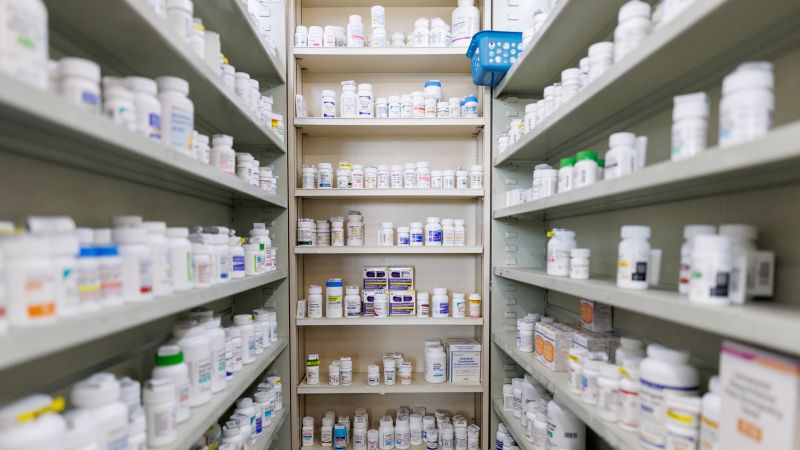Listen to the article
In an era of soaring prescription drug costs, President Donald Trump has repeatedly made a bold but mathematically impossible promise to the American public regarding his “most favored nation” drug pricing policy.
Throughout August and September, Trump has claimed at numerous public events that his executive order from May will reduce prescription drug prices by staggering percentages – ranging from 500% to 1,500%. At a recent rally, Trump declared, “We’re gonna be reducing drug prices down to a level that nobody – not by 20%, 30% – by like 1,000%.” Just this Monday, he reiterated similar figures, promising reductions of “1,000% – by 900, 600, 500, 1,200.”
Health economists and mathematical reality, however, tell a different story. These claims are fundamentally impossible.
Timothy McBride, a health economist and professor at Washington University in St. Louis School of Public Health, explained the absurdity of these statements: “I know of no drug company in the world that would give a person $400 to buy a drug that they are now pricing at $100.” As McBride points out, even a 100% reduction would merely make a drug free – anything beyond that would mean pharmaceutical companies paying consumers to take their medications.
A 500% price reduction on a $100 drug, for instance, would result in a negative $400 price – an economic impossibility in any market.
Trump’s “most favored nation” policy, introduced through an executive order earlier this year, aims to ensure Americans pay no more for prescription drugs than the lowest price offered in other developed countries. This approach targets the significant price disparities between the U.S. and other nations, where Americans often pay several times more for identical medications.
In a confusing Fox News interview last week, Trump attempted to explain his strategy, suggesting that he would pressure pharmaceutical companies to both lower U.S. prices and moderately raise prices in other countries to offset their losses. “The drug companies agree that I’m right,” Trump claimed, adding that he would use tariffs against uncooperative countries.
During this explanation, Trump described a scenario where a pill priced at $10 elsewhere but $100 in America would be harmonized – with foreign prices rising to $20 while U.S. prices fell to $20. This would represent an 80% decrease for Americans – significant, but nowhere near the 1,000% reduction he continues to promise.
When CNN questioned the White House about these mathematically impossible claims, spokesperson Kush Desai sidestepped the specific percentages, instead focusing on Trump’s broader point: “President Trump has correctly identified how Americans pay several times more for the same exact drugs as their peers in other wealthy nations.”
When pressed further, White House officials speaking anonymously offered an example of a drug that costs $521 in the U.S. versus $45 in Australia – a difference they characterized as “roughly 1,000% higher.” However, reducing that price from $521 to $45 would constitute a 91% decrease, not the 1,000% cut Trump continues to promote.
The pharmaceutical industry has historically resisted such pricing reforms, and experts question whether the executive order alone can accomplish meaningful price reductions without additional legislative action.
While addressing the genuine issue of prescription drug affordability, Trump’s persistent claims of 1,000%+ price reductions represent mathematical fiction rather than achievable policy outcomes – a distinction that matters to millions of Americans struggling with medication costs.
Fact Checker
Verify the accuracy of this article using The Disinformation Commission analysis and real-time sources.




10 Comments
The fact check in this article highlights the importance of scrutinizing political claims, especially those that seem to defy basic mathematics. While the goal of lowering drug prices is laudable, the analysis shows that the president’s specific promises are simply not possible. Maintaining a focus on realistic, data-driven policymaking is crucial.
Well said. Fact-checking is vital to ensure that public discourse and policy decisions are based on accurate information, not hyperbole or wishful thinking. Keeping the discussion grounded in economic realities is key to developing sustainable solutions.
This article provides a valuable reality check on the president’s claims about drug pricing. While the desire to lower costs is understandable, the math simply doesn’t add up. Rigorous analysis is needed to identify genuine, feasible policy options.
I agree. Overstating potential impacts, even with good intentions, can undermine the credibility of important policy proposals. Grounding discussions in economic realities is essential for developing effective solutions.
This article highlights the need for nuance and fact-based analysis when it comes to policy proposals around drug pricing. Overstating the potential impact, even with good intentions, can undermine credibility and trust.
Well said. Transparency and accountability are crucial when it comes to issues that affect public health and the economy. Exaggerated claims, no matter the motivation, should be met with scrutiny.
The economic realities of the pharmaceutical industry make claims of 1,000% drug price reductions simply unrealistic. While the goal of lowering costs is admirable, the analysis in this article highlights the need for more grounded, data-driven policymaking.
Absolutely. Fact-checking is essential to ensure that policy debates are based on accurate information, not hyperbole. Maintaining a clear-eyed, evidence-based approach is key to developing effective and sustainable solutions.
Interesting fact check. It’s important to scrutinize grandiose political claims, especially those that seem mathematically implausible. Drug pricing is a complex issue, and any proposed reforms need to be grounded in realistic economic realities.
Agreed. While the desire to lower drug costs is understandable, making claims that defy basic math is not a constructive approach. Rigorous analysis is needed to find genuine, feasible solutions.